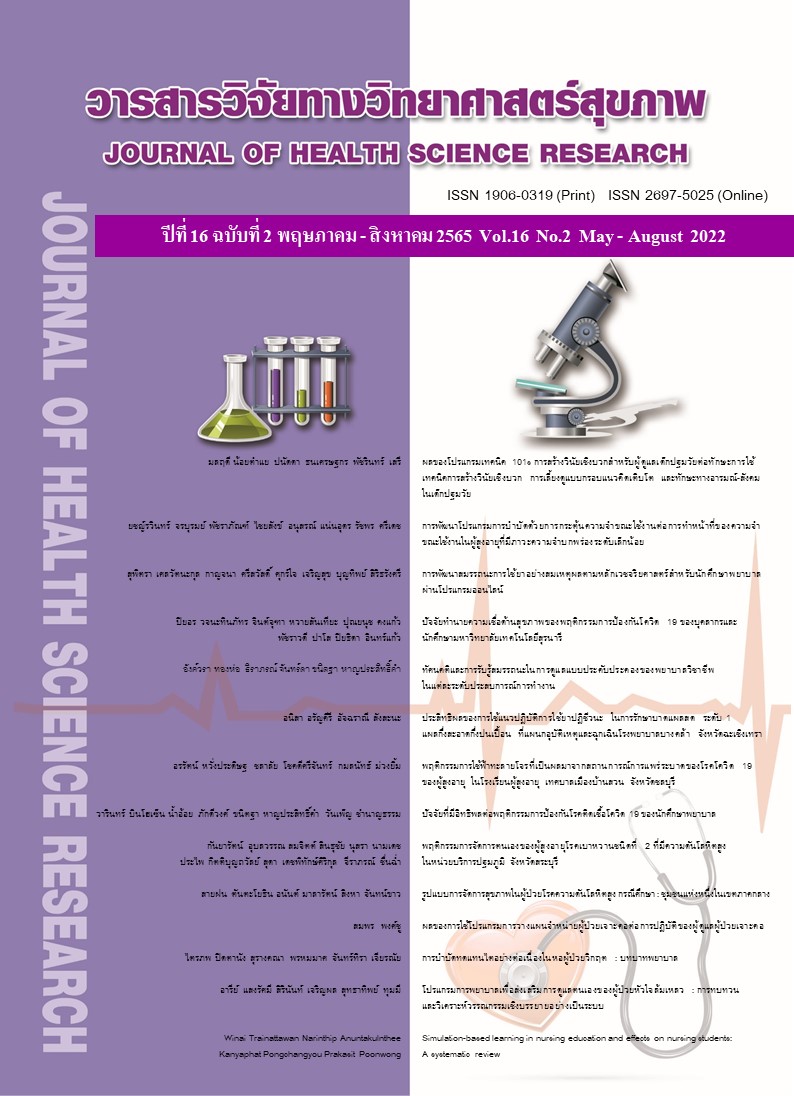การพัฒนาสมรรถนะการใช้ยาอย่างสมเหตุผลตามหลักเวชจริยศาสตร์ สำหรับนักศึกษาพยาบาลผ่านโปรแกรมออนไลน์
Main Article Content
บทคัดย่อ
บทนำ : การบริหารยาที่ผิดพลาดนับเป็นปัญหาด้านจริยธรรมทางการพยาบาล มีความสำคัญต้องพัฒนาสมรรถนะด้านเวชจริยศาสตร์สำหรับนักศึกษาพยาบาล เพื่อให้มีสมรรถนะการใช้ยาอย่างสมเหตุผลตามหลักเวชจริยศาสตร์ และสมรรถนะการใช้ยาอย่างสมเหตุผลบัณฑิตพยาบาลตามสภาการพยาบาลกำหนด
วัตถุประสงค์การวิจัย : เพื่อเปรียบเทียบสมรรถนะการใช้ยาอย่างสมเหตุผลตามหลักเวชจริยศาสตร์ก่อนและหลังการเรียนโปรแกรมออนไลน์สำหรับนักศึกษาพยาบาล และเพื่อศึกษาความพึงพอใจของนักศึกษาพยาบาลต่อการเรียนโปรแกรมออนไลน์การใช้ยาอย่างสมเหตุผลตามหลักเวชจริยศาสตร์
วิธีการวิจัย : การวิจัยกึ่งทดลองแบบกลุ่มเดียววัดก่อนหลังการทดลอง สุ่มกลุ่มทดลองเป็นนักศึกษาพยาบาล จำนวน 40 คน ให้กลุ่มทดลองเรียนโปรแกรมออนไลน์การใช้ยาอย่างสมเหตุผลตามหลักเวชจริยศาสตร์ผ่านแพลตฟอร์มบน Google classroom วิเคราะห์ข้อมูลเปรียบเทียบสมรรถนะก่อนและหลังการเรียนโปรแกรมออนไลน์ด้วยสถิติทดสอบค่าทีชนิดไม่เป็นอิสระต่อกัน และประเมินความพึงพอใจต่อการใช้โปรแกรมออนไลน์การใช้ยาอย่างสมเหตุผลตามหลักเวชจริยศาสตร์ วิเคราะห์ข้อมูลด้วยสถิติพรรณนา
ผลการวิจัย : กลุ่มทดลองมีสมรรถนะการใช้ยาอย่างสมเหตุผลตามหลักเวชจริยศาสตร์หลังเรียนสูงกว่าก่อนเรียนโปรแกรมออนไลน์ อย่างมีนัยสำคัญทางสถิติที่ระดับ .01 และมีความพึงพอใจต่อการเรียนโปรแกรมออนไลน์การใช้ยาอย่างสมเหตุผลตามหลักเวชจริยศาสตร์ โดยรวมอยู่ในระดับดี
สรุปผล : โปรแกรมออนไลน์ที่พัฒนาขึ้นสามารถพัฒนาสมรรถนะการใช้ยาอย่างสมเหตุผลตาม
หลักเวชจริยศาสตร์สำหรับนักศึกษาพยาบาลได้
Downloads
Article Details

อนุญาตภายใต้เงื่อนไข Creative Commons Attribution-NonCommercial-NoDerivatives 4.0 International License.
บทความที่ได้รับการตีพิมพ์เป็นลิขสิทธิ์ของวิทยาลัยพยาบาลบรมราชชนนี จังหวัดนนทบุรี
ข้อความที่ปรากฏในบทความแต่ละเรื่องในวารสารวิชาการเล่มนี้เป็นความคิดเห็นส่วนตัวของผู้เขียนแต่ละท่านไม่เกี่ยวข้องกับวิทยาลัยพยาบาลบรมราชชนนี จังหวัดนนทบุรี และคณาจารย์ท่านอื่น ในวิทยาลัยฯ แต่อย่างใด ความรับผิดชอบองค์ประกอบทั้งหมดของบทความแต่ละเรื่องเป็นของผู้เขียนแต่ละท่าน หากมีความผิดพลาดใด ๆ ผู้เขียนแต่ละท่านจะรับผิดชอบบทความของตนเองแต่ผู้เดียว
เอกสารอ้างอิง
World Health Organization. The pursuit of responsible use of medicines: Sharing and learning from country experiences. Switzerland: WHO Press; 2012. [Cited 2022 Jan 5]; Available from https://apps. who.int/iris/handle/10665/75828.
Hmuenpha R, Puripunyavanich N. Rational drug use drug [internet]. 2015. [cited 2021 Jan 20]; Available from: https://ccpe.pharmacycouncil.org/showfile.php?file=209. (in Thai).
Gunes U, Efteli E, Ceylan B, Baran L, Huri O. Medication errors made by nursing students in Turkey. Int. J. Caring Sci. 2020;13(2):1183-93.
Chongtrakun P. Rational use of medicines in Primary care. 12th ed. Bangkok: Wanida Printing; 2018. (in Thai).
Rational Use of Drug Subcommittee. Teacher’s guide for promoting rational drug use. Nonthaburi: Food and Drug Administration, Ministry of Public Health, Thailand; 2017. (in Thai).
Wanthanatas R, Sritragool R, Dapha S, Changming A, Learahabumrung P, Naklamai A . Development of a nursing clinical supervision model for High Alert Drugs (HADs) administration with nurse supervisors’ participation in NakhonPathom Hospital. Journal of Nursing and Health Care 2018;36(1):234-43. (in Thai).
Thongjam R, Phrakhrubhavanabodhikun. Ethics in nursing practice. Journal of Graduate MCU KhonKaen Campus 2020;7(1):29-44. (in Thai).
Nursing Council. Summary of the form of packaging of the course of rational drug use in the Bachelor of Nursing program. Nonthaburi: Nursing Council; 2017. (in Thai).
Project working group to evaluate the application of the rational use of medicines in the bachelor of nursing program Nursing Council. Handbook of teaching management of rational drug use in the Bachelor of Nursing program. Bangkok: Danex Intercorporation; 2019. (in Thai).
Turner K, Radabutr M, Laokosin N, Thadakant S, Vaisurasingha L. An evaluation of the processes of integrating the rational drug use curriculum into the Bachelor of Nursing Science Program, Academic Year B.E. 2561. Journal of Health Science Research. 2019;13(2):103-16. (in Thai).
Charoensuk S, Leungratanamart L, Reunreang T, Turner K, Theinpichet S.
An evaluation of competency in rational drug use of nursing graduates. Journal of The Royal Thai Army Nurses. 2020;21(2): 158-68. (in Thai).
Charoennan T, Sutanatphakchana S, Thongson P. The effectiveness of online learning with google classroom on creating work with Microsoft Powerpoint for Prathomsuksa 6 Students. MBU Education Journal : Faculty of Education Mahamakut Buddhist University 2019;7(1):381-96. (in Thai).
Branson RK, Rayner GT, Cox JL, Furman JP, King FJ. Interservice procedures for instructional systems development: Executive summary and model. Tallahassee, FL: Center for Educational Technology, Florida State University. Springfield; 1975.
Cohen J. Statistical Power Analysis for the behavioral sciences. Burlington: Elsevier Science; 2013.
Siritarungsri B, Soranasathaporn S, Tubtheing W, Maprangwan S. Teaching reading strategies on the internet for graduate students at School of Nursing, Sukhothai Thammathirat Open University. Nonthaburi : Sukhothai Thammathirat Open University; 2012. (in Thai).
Sarakshetrin A, Rungnoei N, Yoomung P. Development of the supplementary curriculum for promoting rational antibiotic
drug use competencies among nursing students. Journal of Nursing, Public Health, and Education. 2019;20(3):187-99. (in Thai).
Yupornphan T. Development of business English reading modules focusing on business ethical issues to enhance critical reading skills and business ethical awareness for the students of Rajamangala University of Technology Rattanakosin. Veridian E-Journal, Silpakorn University: Humanities, Social Sciences, and Arts. 2013;6(1):209-23. (in Thai).
Faimuenwai R, Rodsreeda P. Learning achievement and students’ satisfaction toward instruction via Google Classroom in the BNS 102 course (culture and health). In Yamkasorn A. editor. Proceeding of RSU National Research Conference 2017. 28th April 2017; Thailand. Pathum Thani: Rangsit University; 2017. p.1323-32. (in Thai).
Kim S, Hee Jeong S, Kim HS, Jeong YJ. Academic success of online learning in undergraduate nursing education programs in the COVID-19 Pandemic Era. J Prof Nurs. 2022;38:6-16. doi: 10.1016/j.profnurs. 2021.10.005.


